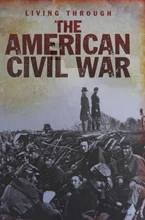Hundreds of American Civil War books free. Presidency of Abraham Lincoln pdf. US history 1861-1865. Confederacy, campaigns, personal narratives, regimental histories, military prisons, naval operations, hospitals, secret service, female participation in war, pictorial works.
Check “Media Type” in left column of Internet Archive pages for audio, movie and image files.
Table of contents
U.S. History Book Pages on Century Past
Topics – US Civil War Books Free
Click on any topic to find dozens, or even hundreds, of related books at Internet Archive (archive.org). Publication dates range from 1800s to 2024. Download pre-1930 books, and register at Internet Archive for free to read modern books online.
US Civil War Era
- Confederate States of America Books
- Confederate Women Stories
- U.S. Civil War 1861-1865
- U.S. Civil War African Americans
- Civil War Participation by African Americans
- Civil War Anecdotes
- Civil War Biography Books
- U.S. Civil War Campaigns Books
- Civil War Causes
- Civil War Destruction and Pillage
- U.S. Civil War Economic aspects
- Civil War Fiction
- Civil War Juvenile Fiction
- Civil War Hospitals Books
- U.S. Civil War Medical Care Books
- U.S. Civil War Naval operations Books
- Civil War Poetry
- U.S. Civil War – NY Public Library Regimental Histories
- U.S. Civil War Personal Narratives
- Civil War Confederate Personal Narratives
- Civil War Pictorial Works
- U.S. Civil War Prisoners and Prisons
- U.S. Civil War Public Opinion
- Civil War Foreign Public Opinion
- U.S. Civil War Regimental History Books
- Civil War Registers of Dead
- Civil War Secret Service
- U.S. Civil War Songs and Music
- U.S. Civil War Sources
- U.S. Civil War Technology
- Civil War Underground Movements
- Civil War Veterans
- U.S. Civil War War Work
- U.S. Civil War Women Books Free
- Civil War Participation, Female
- U.S. Foreign relations 1861-1865 Books
- U.S. History 1861-1865 Economic Conditions
- U.S. Politics and Government 1861-1865
- U.S. History 1861-1865 Social Conditions
- U.S. History 1861-1865 Social Life and Customs
Related Pages on Century Past
Here are CenturyPast.org pages with books or other resources on related subjects. Use the top Menu to look through our 400+ pages.

